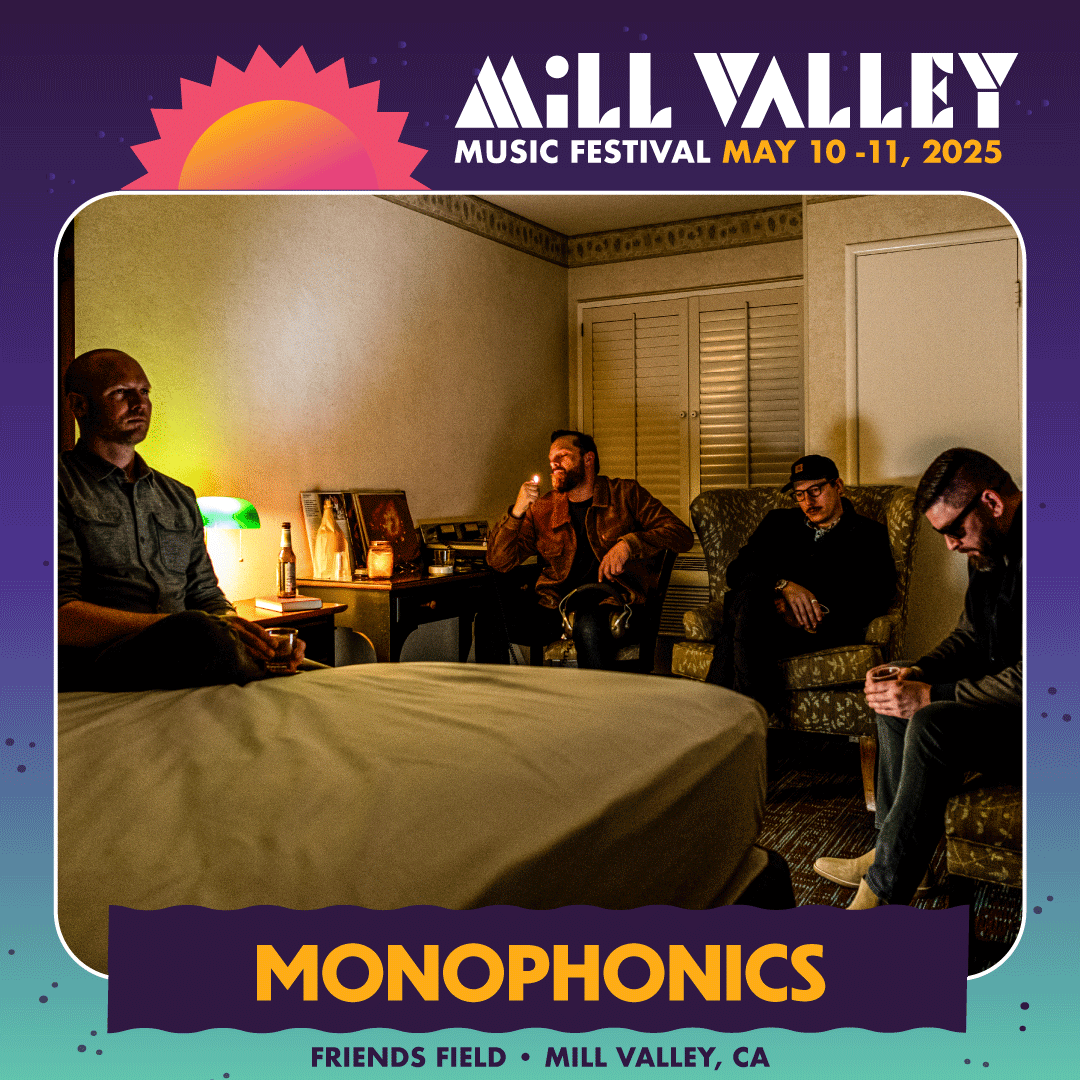by Mike Lisching
Since their formation in the mid-2000s, Monophonics have carved a unique path as one of the most respected psychedelic soul bands in modern music. With a gritty analog aesthetic and emotionally resonant songwriting, the Bay Area-based band—led by powerhouse vocalist and producer Kelly Finnigan—has brought vintage soul into the 21st century. Their discography, relentless touring, and timeless sound have earned them a global fanbase and industry acclaim.

Their 2012 breakout album, In Your Brain, redefined their identity—blending fuzzy guitars, cinematic arrangements, and Finnigan’s raw vocal power. This was followed by Sound of Sinning (2015), a lush, harmony-heavy album that showcased their maturing songwriting and helped solidify their reputation across the U.S. and Europe. In 2020, the band released It’s Only Us, recorded at Transistor Sound Studio, which Finnigan built and operated. The album received widespread praise for its warmth, cohesion, and themes of unity and personal growth.
In 2022, Monophonics released Sage Motel, a concept album telling interwoven stories of heartbreak, addiction, and faded dreams taking place inside a fictional roadside motel. It marked their most ambitious work to date, combining soul noir aesthetics with deep storytelling and layered production. Throughout their catalog, Monophonics draw inspiration from artists like Curtis Mayfield, Isaac Hayes, and the Temptations’ Norman Whitfield era—yet always with a contemporary edge.
Monophonics continues to captivate live audiences with emotionally charged performances and deep musicality. With new material in the works and a loyal global fanbase, Monophonics remain one of the most vital and innovative voices in modern soul music.
I caught up with Kelly Finnigan last week from his studio in Ohio. A longtime Bay Area resident, Kelly recently moved to Ohio, looking to change things up and for proximity to Colemine Records.
After more than 15 years of touring, the band is focused on writing a new record over playing out, so it’s exciting to have them at the Mill Valley Music Festival on Sunday, May 11.
It’s one of those things where, like honestly, the fans do it, they unlock that door always, because no matter how much I’m inside myself or I’m whatever’s going on on stage, I ultimately am there, and trying to connect with whatever it is, 50, 500, 5,000 (people). That is ultimately going to light that fire. Walking out on stage. Seeing the people. That is what allows me to just go right into the songs… And the songs or stories that I have…. How much truth is in them is song to song, but it’s easy when you’re singing your own emotions, your own feelings.
With the band more focused on writing a new album than touring, we dug into what the songwriting process looks like for Kelly and Monophonics.
Usually, for me, things start with music. That kind of drives a lot of things. I definitely have melodies, or, words, subject matters and different things that can feed the music. But I generally do work on the music first. I feel like the mood and the parts. You know the parts that the musicians play, the sonic quality. All this can feed into what I want to say, and if I want it to be this, you know, vulnerable piece of emotion, or just something that’s kind of fun and loose, or you know, something that’s maybe not living, you know, is not living in too much truth. It’s kind of more something that there’s a lot of fantasy, or whatever it is, you know there are no rules, and I think that’s what’s so fun.
Kelly continues, talking on the topic of authenticity.
The only pressure you have is the pressure you put on yourself. One thing I’ve taken comfort in is that anybody who understands songwriting and songwriters knows that you’re not expected to reinvent yourself. You are who you are, and you have a sound, whether that’s Dolly Parton or Curtis Mayfield, or John Prine or Smokey Robinson.
They don’t run away from being Smokey Robinson… You don’t have to be too clever, especially for yourself. I think a lot of artists that we all admire, they found what worked, and they embraced it.
The new record is still in early stages. A collaboration in the works, with everyone sharing ideas remotely. Kelly is the only full-time musician, so this initial phase begins with virtual collaboration.
Right now it’s just sharing from different locations. We haven’t really been able to get together.We have some things scheduled for the next couple of months to get together, and take these ideas and turn them into real-life things.
…it’s bringing in ideas and trying to find what’s gonna drive the next record… It’s a pretty collaborative process between a few people, usually driven by the rhythm section. And it is literally sharing music that we dig, sending little ideas, whether it’s a riff, or like some lyrics. It’s definitely new, which is exciting.
Having entered a new era when Kelly joined the band. Creating “timeless” music is now a north star for the band, early Motown and pop artist vibes informing how they think about crafting their sound.
That’s the goal. If you were to do an idea board, that (“timeless”) would definitely be in bold capital letters.
Part of what we talked about in the early days was the switch. Growing up and getting past this mentality of being this shredding guitar player, and understanding “Hey, you know what’s kind of cooler than that, is being like a really great songwriter, and coming up with like amazing parts.” Like the Funk Brothers did on all those Motown records, like the Wrecking Crew did on so many great pop records. So to us, we took our attention away from being this well-oiled technical, musical thing. It was more like, well, now we need to figure out the vibe of how they made these records we all love.
Whether that is a Rolling Stones record or a Temptations record produced by Norman Whitfield, who produced all the psychedelic soul stuff on Cloud 9. That’s a part of like being a student… That is a big part of my process. Listening to music, but also like trying to peel the layers away and figure out how it worked. And as you do this, you figure out that it’s such an in-the-moment thing. The most brilliant things on records were not like calculated and discussed for hours. It was just somebody thought of something, and then they did it, and it was fucking, brilliant. And that’s just how things work with art.
There is great intention delineating pure/classic Kelly Finnigan soul and Monophonics’ stretched psychedelic soul.
I write with purpose. I go into things with a mindset because I like to keep them separate. It’s definitely like “I’m putting on my Monophonics hat”, because my solo stuff is definitely like traditional soul music, rhythm and blues. Rooted in all that stuff of the sixties pop and soul and gospel and all that stuff.
Monophonics, I really feel like I can experiment, I can color outside the lines. Yes, we are rooted in a sound…but I’m definitely gonna take more chances and try more things when I’m working on Monophonics. I feel I can push the boundaries… I kind of like to do that and break rules and introduce different things.
Being such a music and production nerd I couldn’t help but ask Kelly about the album he would have loved to be in the studio for.
No one was making 15-minute songs that weren’t jazz.
…This artist is such a big influence on me, the record “Hot Buttered Soul”. Which isn’t actually the 1st Isaac Hayes solo record. Technically, it’s his second because he did put out something before that which really went under the radar… If you ask most people who listen to it and know it sonically, they would say, it’s a seventies record. But it’s actually from 1968. Which means it was starting to be recorded and conceived in 1967.
You also had someone who was coming out of a really big career as a songwriter and producer at Stax. And now, all of a sudden, he’s a singer, and he’s doing a lot of famous covers. Hit records like “By the time I get to Phoenix” and “Walk on By”. These are pop standards. So for me, I would have loved to have seen how they put that together.
That was also one of the 1st records where they left Stax and went to Detroit and did a lot of recording up in Detroit, and that bothered some people in Memphis at Stax. They (Stax) kind of looked at Detroit and Motown as not the enemy but as the competition. Lots of stuff with that record that I find really fascinating.
That record has a lot of layers of like, it’s such a pivotal record for soul music. Because before that, there’s not a ton of dramatic orchestration, big thematic music, and all the fun wah and the blackness of that record. To me, it’s a masterpiece record.
Hearing Kelly wax poetic on Hot Buttered Soul left me wondering how we will be talking about the Monophonics albums 30 years from now. The new Monophonics album can’t come soon enough. In the meantime, you can get a taste to hold you over at the Mill Valley Music Festival on May 11. This weekend! Get your tickets now!




Leave a reply